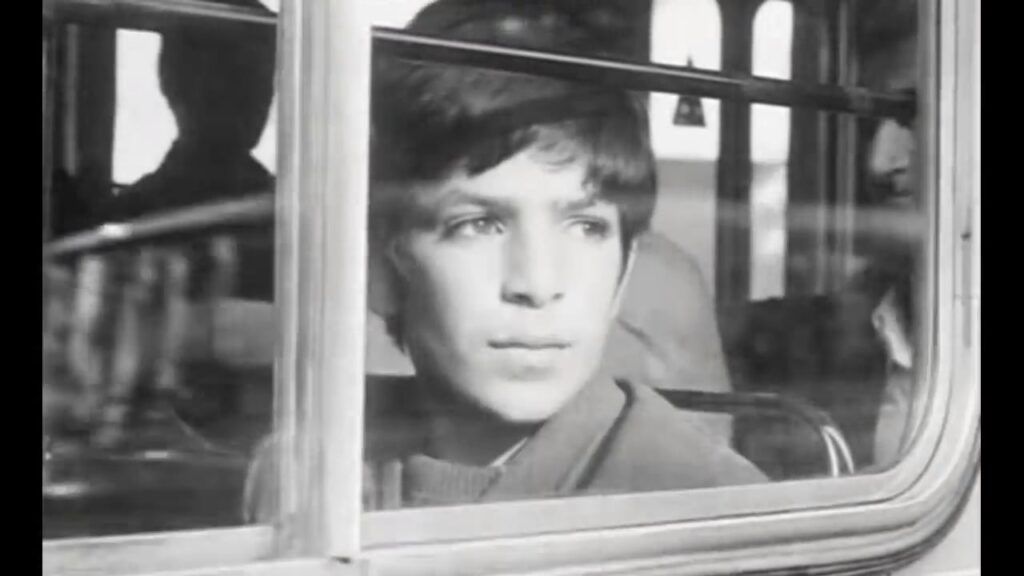The Experience is far removed from what most consider Abbas Kiarostami’s feature debut, The Traveller, despite preceding it by only one year. It shows the director’s potential even within a short narrative (just over 50 minutes), and is more complex than his two previous shorts. In a curiously amusing way befitting Kiarostami, The Experience has been ill-fittingly described as a “love melodrama,” when in fact it’s a fairly obvious subversion of a sub-genre famous in Iranian cinema: the poor-boy-falls-for-rich-girl movie. Its protagonist, Mamad, is an orphaned adolescent who works (and usually sleeps) in his boss’s photo studi. Smitten with a slightly older girl, who lives in an affluent neighborhood, he dutifully prepares his only good clothes in order to best present himself to the girl’s family as a suitable candidate. The mother politely informs him that she will talk it over with her husband, and asks Mamad to return later that afternoon. Mamad, emboldened by his courage, amuses himself with adult pleasures—like smoking in a movie theatre—while he awaits the ultimate verdict.
There is a reason the film is so short—when Mamad’s answer arrives, its delivered by the girl of his dreams, and communicated abruptly through the opening and then sudden closing of a door. The film has nowhere else to go, much like Mamad himself; only a bird’s-eye view of Mamad, whose expression is not visible to the viewer, feels appropriate for Kiarostami, who refuses to dwell on this tragedy. Mamad pauses at the closed door before leaving the girl’s home, and the screen. The overhead shot continues for a few moments, before blurring into nothingness. The path to this moment is, much like Kiarostami’s later works, filled with what could superficially be deemed tedium. The Experience is built around nothing but seemingly trivial events, in which Mamad is fulfilling his obligations as a servant and occasionally cleaning up after his brief and harmless moments of escape—like when he slips on his boss’s shiny dress shoes. Mamad’s work takes up almost all his waking hours—and the time itself—serving to fully demonstrate his isolation and alienation from any kind of social life. Mamad is almost entirely silent, and so is the film, with its very few exchanges originating from a scolding boss and an equally condescending brother.
The hidden feelings of a Kiarostami character have a way of feeding into their containing film’s more overt intentions, and The Experience proves this was an early talent.
Kiarostami’s exposés on childhood abuse would come later (in his 80s films Where is the Friend’s Home? and Homework, respectively), but in The Experience, as in many Kiarostami films of the ’70s, adolescent fantasies are already playing out to tragically ironic effect. Like other tenacious young Kiarostami protagonists, who break rules to attain life’s simple pleasures, it’s easy to see Mamad as Kiarostami’s young self. But in fact this story was penned by the famous Iranian director Amir Naderi, whose own upbringing was unimaginably impoverished. While Kiarostami films like A Suit for Wedding and The Traveller focus on the limited, sometimes immoral opportunities of working-class boys to experience middle-class comforts, Mamad seeks to live vicariously as an adult—and the camera is quick to point out physical shortcomings inherent to this desire, be they his small feet, which require padding in his boss’s shoes, or a movie theater teller’s eye-line on Mamad’s neck, as opposed to his stomach, when purchasing a ticket (it’s difficult to tell, but the film he’s admitted into is probably intended for adults, judging by the age of the audience in the theater).
Ultimately what makes this theme of children’s desire for adult status most cutting can be found in a line easy for non-Persian viewers to miss. It’s the result of a scene wherein Mamad glues a woman’s photo to a cardboard cutout of a female model, revealing burgeoning erotic desires. Mamad’s boss punishes him for misuse of company supplies, but in the midst of his reprimand, he barks, “You can still smell milk on your breath.” This is a Persian expression; it insinuates that Mamad’s sublimations through imagery are too sexual, too early. The hidden feelings of a Kiarostami character have a way of feeding into their containing film’s more overt intentions, and The Experience proves this was an early talent—because what is more quintessential to the friction of adolescence/adulthood than sexual desire? This is also the least acceptable desire for adolescents, especially in a Muslim culture. The Experience is a very simple but emphatic exploration of boyhood desires more complex than rudimentary pleasure. Kiarostami understands that for children in a society like Iran’s, adulthood cannot come soon enough.


Comments are closed.